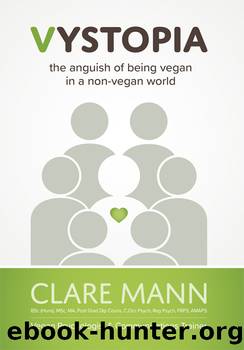Vystopia: The Anguish of Being Vegan in a Non-Vegan World by Clare Mann

Author:Clare Mann
Language: eng
Format: epub
Publisher: Communicate31 Pty Ltd
Published: 2018-03-15T00:00:00+00:00
Why Wonât My Partner Become Vegan?
People in relationships often want their partners to change aspects of their behaviour. For example, someone may wish their partner would lose weight, exercise more, drink less, or keep better company. There are big differences in what people tolerate in relationships and whilst theyâd prefer them to change, itâs often not a deal-breaker. After all, much of the desired change would actually benefit the other person. However, in the eyes of the vegan who is passionate about ending animal abuse, the benefit to their partner is secondary to the rights of animals.
The vegan is effectively asking their non-vegan partner to put aside any discomfort, ridicule, inconvenience, or resistance from others, because itâs just wrong to be part of anything that exploits animals. This can be a hard sell to an otherwise perfectly reasonable human being, who is hearing about veganism for the first time. Not only do they have to deal with a partner who is often miserable because of what they now know, they are also being asked to tread the same path. Until the non-vegan emotionally connects with animal suffering, they are unlikely to change unless itâs to hold on to their partner who says they will otherwise end the relationship. In many cases, a non-vegan partner, like other non-vegans, may emotionally abhor animal cruelty but other factors, including laziness, stand in the way of them changing. By learning about these and appreciating peopleâs resistance, you can influence them to change rather than assuming they donât care.
Understanding a Personâs Resistance to Change
Personality Differences
People have different ways of operating in the world including how they process new information and make decisions. Some people like more detailed facts and figures to form their views whereas others are more intuitive. Some are more logical when faced with new information whereas others base their decisions on values, regardless of logical arguments. By learning how different people typically operate, resistance can be reduced by presenting information differently.
Avoidance of Conflict
Many people fear conflict with other people and avoid talking about anything that will cause resistance, blame, or self-consciousness. They may lack the skills to have conversations that matter or are overwhelmed by the emotions that accompany these conversations, saying things that others donât agree with or which affect other people.
Difficulty in Understanding Oneâs Own Emotions
People have different levels of self-awareness and many find it hard to identify, label and communicate what they are feeling. A person who struggles with their own emotions may avoid doing anything that causes them any anxiety because they struggle with the self-consciousness that results.
Social Pressure to Conform
Enormous pressures exist to get people to conform to ânormalâ behaviour, and those who resist are often rejected from groups they value. Some people fear standing out, feeling self-conscious or lonely, although by conforming they often face internal conflict between their real values and their actions. As veganism becomes the norm, some individuals will change because thatâs the socially acceptable thing to do.
Limited Capacity for Empathy
Peopleâs ability to imagine the suffering of other living beings varies.
Download
This site does not store any files on its server. We only index and link to content provided by other sites. Please contact the content providers to delete copyright contents if any and email us, we'll remove relevant links or contents immediately.
| Deconstruction | Existentialism |
| Humanism | Phenomenology |
| Pragmatism | Rationalism |
| Structuralism | Transcendentalism |
| Utilitarianism |
The remains of the day by Kazuo Ishiguro(8977)
Tools of Titans by Timothy Ferriss(8366)
Giovanni's Room by James Baldwin(7330)
The Black Swan by Nassim Nicholas Taleb(7109)
Inner Engineering: A Yogi's Guide to Joy by Sadhguru(6785)
The Way of Zen by Alan W. Watts(6601)
Asking the Right Questions: A Guide to Critical Thinking by M. Neil Browne & Stuart M. Keeley(5759)
The Power of Now: A Guide to Spiritual Enlightenment by Eckhart Tolle(5757)
The Six Wives Of Henry VIII (WOMEN IN HISTORY) by Fraser Antonia(5501)
Astrophysics for People in a Hurry by Neil DeGrasse Tyson(5182)
Housekeeping by Marilynne Robinson(4436)
12 Rules for Life by Jordan B. Peterson(4299)
Double Down (Diary of a Wimpy Kid Book 11) by Jeff Kinney(4261)
Ikigai by Héctor García & Francesc Miralles(4247)
The Ethical Slut by Janet W. Hardy(4242)
Skin in the Game by Nassim Nicholas Taleb(4239)
The Art of Happiness by The Dalai Lama(4125)
Skin in the Game: Hidden Asymmetries in Daily Life by Nassim Nicholas Taleb(3991)
Walking by Henry David Thoreau(3953)
